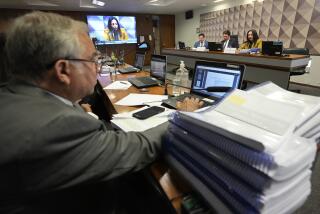U.S. Congress members express ‘deep concern’ over threats to democracy in Brazil
Reporting from Rio de Janeiro — On the eve of the Summer Olympics here, 40 Democratic members of the U.S. House of Representatives published a letter Monday expressing “deep concern” about threats to democracy in Brazil.
The letter, addressed to U.S. Secretary of State John F. Kerry, criticized the impeachment process that led to the removal of President Dilma Rousseff in May to stand trial in the Senate on charges of breaking budgetary rules. If convicted, she will be permanently removed from office.
While she awaits trial, Vice President Michel Temer, an ally-turned-enemy, has taken over.
The U.S. lawmakers urged Kerry to “exercise the utmost caution in your dealings with Brazil’s interim authorities and to refrain from statements or actions that might be interpreted as supportive of the impeachment campaign launched against President Dilma Rousseff.”
The letter, which was backed by the AFL-CIO and other labor union groups as well as nongovernmental organizations focused on Latin America, said that “the impeachment process has come under fire for procedural irregularities, corruption and political motivations from its beginning.”
“The U.S. government should express concern about the threat to democratic institutions unfolding in a country that is one of our most important political and economic allies in the region,” it said.
Luiz Alberto Figueiredo Machado, the Brazilian ambassador to the United States, had urged members of Congress to not sign the letter. In his letter to them, he said that the impeachment is “proceeding rigorously in accordance with the mandates established by Brazilian law.”
“Brazil sees with concern and rejects any attempt to discredit its institutions, or to question the rectitude by which a constitutional and republican legal instrument, such as the impeachment process — is implemented,” he wrote.
The move against Rousseff came as much of Brazil’s political establishment — including Temer and the majority of legislators who voted to oust the president — faced more serious accusations of corruption or other crimes.
Recordings leaked after the vote to try the president showed that congressmen hoped to use impeachment to stop investigations against themselves. The accusations against Rousseff are not considered crimes.
Once Temer assumed office, he installed a much more conservative government, but three of its Cabinet ministers immediately were forced to step down amid corruption accusations.
A recent poll by the Datafolha agency found that 62% of Brazilians would prefer new elections to keeping either Temer or Rousseff in office. Just under half of those surveyed believe the impeachment is constitutional.
Over the last several months, few U.S. officials have weighed in on the controversy. The U.S. State Department has said it would not comment on Brazil’s democracy.
Power struggles in Latin America’s largest country could play out for the world to see at the Olympic Games, set to start Aug. 5. Kerry is expected to attend, but many heads of state are reportedly planning to stay away, eager to avoid the awkward question of which Brazilian president to embrace.
Bevins is a special correspondent.
More to Read
Sign up for Essential California
The most important California stories and recommendations in your inbox every morning.
You may occasionally receive promotional content from the Los Angeles Times.










